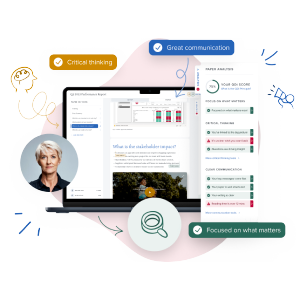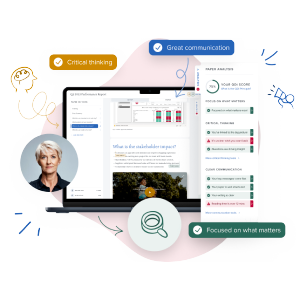Innovation happens at the intersection between contrasting ideas and contrasting perspectives. That’s why seven speakers, who are neither typical business leaders nor typical governance professionals, were asked to share their insights at the Board Intelligence Conference in November 2019. Here’s some of what we’ve learnt.
It would not be contentious to say that John Bercow MP divides opinion. In October, Mr Bercow asked fellow member of Parliament David Lammy to join a diverse recruitment panel to help recruit a new Sergeant at Arms for the House of Commons. Ugbana Oyet was successfully hired — but not before Mr Bercow had rejected an initial candidate list and asked to be brought a diverse one.
The political opinions of Mr Bercow and Mr Lammy are somewhat divided by the ideological tribe to which they belong. Yet this seemingly small act — of insisting on a diverse panel and a diverse candidate list — is significant. And all the more significant that Mr Lammy spoke reverently about this act of fairness and leadership from ‘across the aisle’.
Diversity is a headache for boards. No panacea exists. However, small acts of leadership in diversity, like Mr Bercow’s, will nudge change in the right direction. Mr Bercow has been accused of bullying by some and hailed by others as a responsible guardian of the legislature. Let us not be tribal, but simply acknowledge that we need more small acts of leadership in diversity.
The speakers convened for our conference emanated diversity. Their ideas were rich with contradiction, contrast, and divergence; the perfect ingredients to unsettle the well-worn conversations about board effectiveness. In order to try and distil the insights of seven diverse speakers, we have created some themes.
Cooperation, competition, and meaning
Robert Hogan, former Professor of Psychology at Johns Hopkins University, suggests three important generalisations: humans always live in groups (we need each other); each group has a status hierarchy (we need leaders); and each group is organised by an ideology, religion or belief system (we search for meaning).
This theory gives us a way to evaluate individual behaviour and group dynamics. David Lammy was quick to point out that in/out group behaviour can explain much of our civil discourse and disagreement. Our desire to belong to a group often overrides our critical thinking faculties and corrupts our judgement. For example, we make excuses for the anti-social behaviour of people within our group — including the leader.
Ultimately though, we will need to decide on an ideology that reduces inequality. Globally, “twenty-six people own more wealth than the bottom fifty percent” Mr Lammy says. Can that continue? He says we need leadership. Yet leadership comes with a health warning. As Professor of Organisational Behaviour at Surrey University Eugene Sadler-Smith remarked, the “intoxication of power is indeed one of the greatest dangers of our time”. Hubristic leadership — of which we are not short of living examples — “should be a risk management hazard” claims Professor Sadler-Smith.
Insights for the Board…
- The need to belong can corrupt judgement;
- Collective enterprises need more humble leaders;
- Hubris is a public health hazard.
Demystifying the fog of war
Assuming we are now part of a harmonious group with a humble leader (many can only dream), what we need next is a plan. A central feature of successful leadership is persuading selfish creatures to act unselfishly for the good of the group. This requires vision, communication and focus.
It is here we pivot to the military. The military have refined, through centuries of violence and brutality, some highly effective methods for coordinating group efforts. Retired British Army Tank Commander Patrick Snowball notes that the fundamentals — whether in the military or on boards — should remain the same. Firstly, that group efforts cannot be maximised without total clarity of purpose. Everyone must know where the “flag on the hill” is, Mr Snowball says.
Secondly, communication must be simple and timely. This was evidenced when our CMO tried to conduct a small orchestra assembled to play “God save the Queen”. Rhythmically, what he got back from the orchestra resembled a 17 year old pulling away from traffic lights in an old manual car. As conductor and comedian Rainer Hersch says: “What the orchestra needs above all is information. Information about how they should do their job.”
Thirdly, once the plan has been hatched and communicated, individuals need to focus on their objective. The exemplar of ruthless execution was Susie Rogers’ story of winning Paralympic gold. Through visualisation of her own ‘flag on the hill’ to planning for all eventualities (including drowning), she was unrelenting. However, a coveted skill noted by both Mr Snowball and Ms Rogers was the ability to pivot quickly if the situation changed — the “best laid plans don't actually run past the first shot of the battle” Mr Snowball says. If Amazon announces a move into your industry, probably best to react and adapt.
Insights for the Board…
- Clarity of purpose is critical;
- All information should relentlessly focus on objectives;
- Simple and timely communication is key to orchestrate a group;
- Ability to pivot, fast.
A happy couple: art and science
Now we have an effective group with a humble leader who has communicated tasks and purpose to all, what next? Well, the first thing to consider according to England cricket selector Ed Smith, is that “the concept of a job is changing”. Generation Z are likely to have more careers than Baby Boomers, for example. This is largely driven by the technological revolution which is leading western economies to be more service-driven.
Technology, data and scientific pursuits will help mankind tackle some of the largest issues facing society. Ironically, they helped create some of them as well - carbon emissions, mortgage-backed securities, plastic. As the Queen of Tech, Kathryn Parsons explained, making scientific education less formal and more practical can lead to a 17 year old girl teaching herself data science online for free — and discovering a new way to diagnose breast cancer with 99% accuracy.
Whilst data, science and technology clearly help, Ed Smith said that no algorithm could have helped him make a crucial selection call on whether to select Jos Butler and that “data is very important, but it can never replace human judgment”. Kathryn and Ed seem to prop up a side each of the art and science marriage. What they both agreed on, however, is that lifelong learning is a must. And if you are armed with critical thinking, you can apply that to any career, organisation or problem.
Insights for the Board…
- The concept of a job is changing, the board needs to be on the front foot;
- Science and data can advance mankind, but nothing replaces human judgement;
- Lifelong learning for all is imperative for your survival.
In conclusion
Significant advancements are overwhelmingly the result of collective enterprise, not individual effort. Collective enterprises work best when followers reject self-serving or hubristic leaders who threaten the vitality of the group. Unfortunately, we are poor at detecting them and they are superb at concealment.
When humble leaders invite debate and invite diversity, good things happen. As David Lammy insists: “It takes leadership from the top, it takes leadership from boards”.





